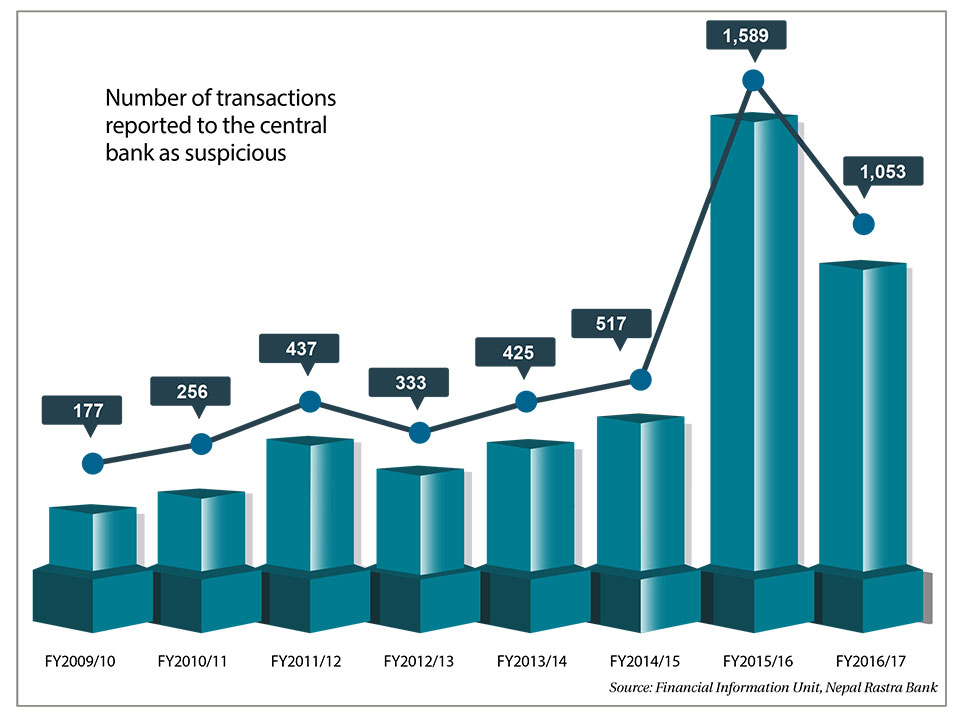
OR
Suspicious transaction reporting by financial institutions falls
Published On: February 28, 2018 08:34 AM NPT By: Republica | @RepublicaNepal

KATHMANDU, Feb 28: The number of suspicious transaction reporting (STR) by financial and other reporting institutions has declined significantly in the last fiscal year -- FY2016/17.
According to the data of Financial Information Unit (FIU) at the Nepal Rastra Bank (NRB), the number of STRs that the unit received in the last Fiscal Year 2016/17 fell to 1,053 from 1,589 in the previous Fiscal Year 2015/16.
The number of STRs in FY2015/16 was higher than the number of STRs that the FIU had received in previous fiscal years.
STRs are detailed information about transactions that are or appear to be suspicious, helping the FIU to identify individuals, groups and organizations involved in fraud, terrorist financing, money laundering and other crimes.
All BFIs, money-changers and remitters, cooperatives, insurance companies, and securities business persons and designated non-financial business and professions like dealers of precious stones and metals, casinos, independent accountants and legal professional, notary public, trust and company service providers, designated government agencies such as the Office of the Company Registrar, Land Revenue Offices and Department of Customs, among others, are legally obliged to report suspicious transactions to the FIU.
FIU requires reporting of all actual or attempted transactions, if the reporting entity has reasonable grounds to suspect that the money/asset is generated from or related to money laundering, terrorist financing, or other offences and illegal activities. It may also include the transactions that are large, complex, unusual, legally or economically impossible, or discordant.
According to the report of the FIU, the top reporting sector for FY2016/17 remained banking sector. The criminality most commonly reported in STRs during FY2016/17 was tax evasion, followed by misuse of payment products.
FIU has attributed the decline in the number of STRs to the fact that the reporting entities have learned to scrutinize and submit only genuinely suspicious activities.
“The numbers of STRs appear to decrease this year. This is mainly due to the submission of quality STRs from the reporting entities,” added the report.
Out of the total STRs, the FIU has said that it forwarded 391 cases to the investigating agencies. According to the report, it disseminated 174 cases related to tax evasion to the Department of Revenue Investigation, 124 to Nepal Police and Central Investigation Bureau, 39 cases to Department of Money Laundering Investigation, and 37 cases to other regulator and supervisor. Similarly, nine cases have been disseminated to the Commission for the Investigation of Abuse of Authority (CIAA) and eight cases to Inland Revenue Department
According to the FIU, an STR converted into intelligence by adding value is disseminated to respective investigating agencies as per their mandate and nature of the case.
You May Like This

Evaluate by third eye, not by external judgment: Prez Bhandari
KATHMANDU, Mar 7: President Bidya Devi Bhandari has said her first term as the Head-of-the-State of Nepal is like an... Read More...

Bill related to bank and financial institutions endorsed
KATHMANDU, Jan 10: The meeting of the Legislature-Parliament on Tuesday, by a majority has endorsed the bill related to bank... Read More...

U.S. envoys appointed by Obama asked to quit by Inauguration Day
U.S. President-elect Donald Trump's transition team has issued a blanket mandate requiring politically appointed ambassadors installed by President Barack Obama... Read More...



Just In
- President Paudel approves mobilization of army personnel for by-elections security
- Bhajang and Ilam by-elections: 69 polling stations classified as ‘highly sensitive’
- Karnali CM Kandel secures vote of confidence
- National Youth Scientists Conference to be organized in Surkhet
- Rautahat traders call for extended night market hours amid summer heat
- Resignation of JSP minister rejected in Lumbini province
- Russia warns NATO nuclear facilities in Poland could become military target
- 16th Five Year Plan: Govt unveils 40 goals for prosperity (with full list)














Leave A Comment